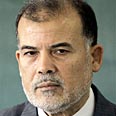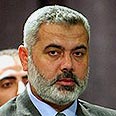

The Hamas and Fatah have agreed that Mohammed Shabir, 60, formerly the head of Gaza's Islamic University, should head the new government, Moussa Abu Marzouk, a top official at Hamas' Syrian headquarters, told The Associated Press.
Shabir did not deny he was being considered, but said he has not been officially designated. Shabir, who has a doctorate in microbiology from West Virginia University, is considered to be close to Hamas but not an active supporter.
A Hamas official, speaking on condition of anonymity pending an official announcement, said Shabir had accepted the post. Shabir was not available for comment.
Respected economist Salam Fayyad, meanwhile, is being considered for the post of finance minister, a job he held until the Hamas-led government took office early this year.
Fayyad was credited with fighting mismanagement and cronyism, and his return to the treasury would likely go far in lifting a crippling international aid boycott.
Hamas and Fatah hope that Shabir and Fayyad will be acceptable to the international community and help persuade the West to lift economic sanctions on the Hamas-led government. Israel and Western donor nations have demanded that Hamas renounce violence and recognize Israel's right to exist.
'US backs Shabir's candidacy'
Palestinian officials said the United States has already expressed backing for Shabir's candidacy.
Micaela Schweitzer-Bluhm, spokeswoman of the US Consulate in Jerusalem, declined to say whether Shabir - and the rest of the next Palestinian Cabinet - would be acceptable to the US.
"When they're announced, we'll be looking not only at who they are but what their program platform is," She said.
She noted that the US has been in touch with Palestinian President Mahmoud Abbas, a moderate from Fatah, during his negotiations with Hamas but said the US does not approve or veto individual candidates.
In Brussels, EU External Relations Commissioner Benita Ferrero-Waldner hinted at flexibility.
"If a new government is formed, we need to be firm on the principles, but we must be flexible about the form in which the commitments are expressed," Ferrero-Waldner said. "I very much hope that we still can see a government which takes positions which allow us to re-engage."
The leading candidate for the third key post, foreign minister, is Ziad Abu Amr, an independent lawmaker with ties to both factions, officials close to the talks said.
Abu Amr has mediated between Hamas and Fatah in the past. The post is currently being held by a Hamas hard-liner, Mahmoud Zahar.
Hamas is not opposed to the appointment of Abu Amr and Fayyad, officials said. The sides were holding more talks in Gaza on Monday. The officials spoke on condition of anonymity because they weren't authorized to discuss the issue with the media.
Months of talks between Fatah and Hamas have failed to lead to the establishment of a unity government. In recent days, however, both sides said progress had been made, and Abbas said he hoped a government would be in place by the end of November.
None of the appointments are certain, but Shabir was one of four officials presented for the post of prime minister and is considered to be the leading candidate, a Hamas official close to the talks said.
"No one has informed me officially of this designation. This report can become a reality only if President Abbas designates me officially as prime minister," Shabir told The Associated Press.
Views on conflict with Israel largely unknown
Abbas aides said Shabir is acceptable to the president, and the current prime minister, Ismail Haniyeh, said there no longer is any dispute with Abbas over who the next premier will be.
Shabir, who served as president of the Islamic University for 15 years before retiring in August 2005, is not an active Hamas loyalist. During his years in the powerful academic post, Shabir kept good ties with all the Palestinian factions and frequently met with Abbas' predecessor, the late Yasser Arafat.
At the university, Shabir rarely spoke in public about Israel, and his views on the conflict with the Jewish state are largely unknown.
Shabir, originally from the Gaza town of Khan Younis, lives in Gaza City with his six children and his wife, who serves as deputy to the minister of women's affairs.
The international boycott has made it largely impossible for Hamas to pay its 165,000 civil servants, causing widespread hardship in the West Bank and Gaza Strip.
Palestinians have taken to the streets in sometimes violent protests and held prolonged strikes that kept schools shut for two months.
Israel, the US and other Western countries have demanded that Hamas renounce violence, recognize Israel and accept existing peace deals as conditions for lifting the sanctions. Until now, Hamas has rejected the conditions, and officials involved in the unity talks said the new government would be vague on the three principles.















